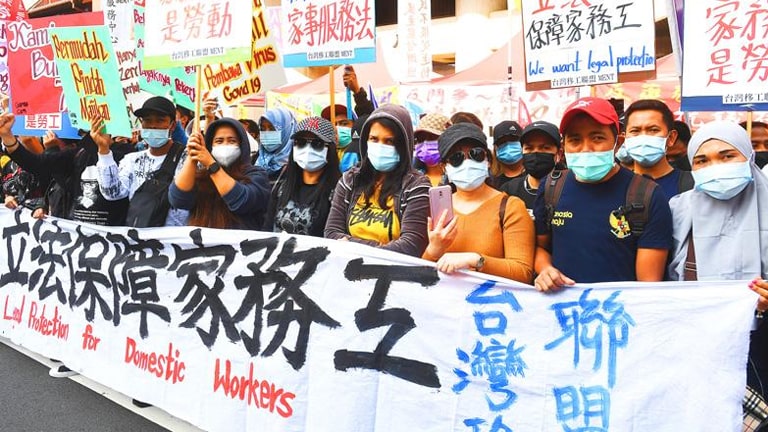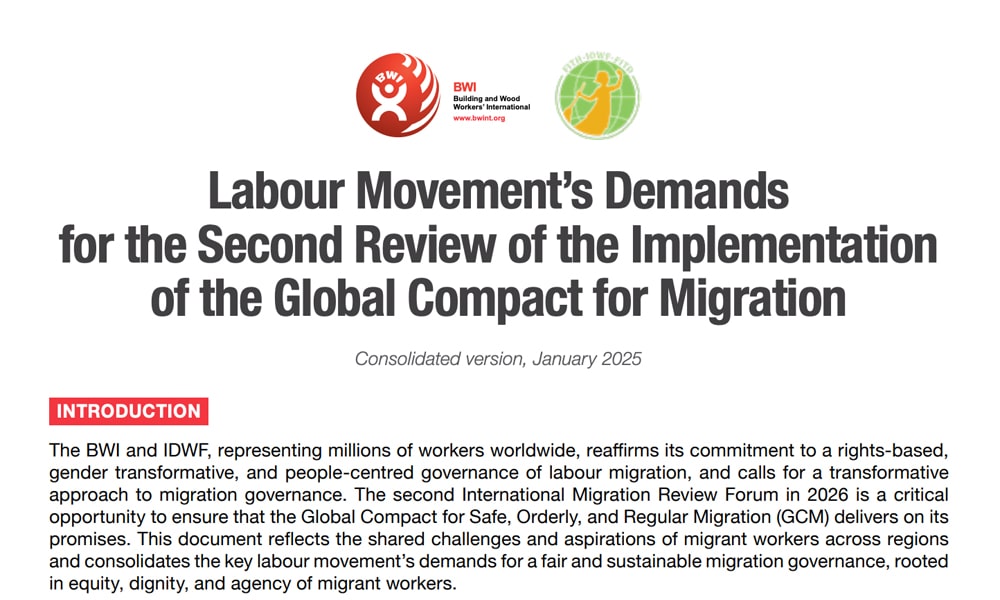DCU together with MENT demand for Domestic Service Act!
Details
💪I want Domestic Service Act
💪PRT butuh lindungan hukum
💪Gusto ko ng Batas para sa Kasambahay
💪Phục vụ việc nhà phải được đảm bảo

Organizer: Taiwan Migrant Workers Alliance (MENT) Press Contact: Liu Xiaoying
There are two important days for migrant domestic workers in May, #LaborDay and #Mother’s Day. Labor Day is a day to commemorate women workers who fought for labor conditions a century ago, while Mother’s Day is a day to honor mothers who have made silent contributions. There are nearly 250,000 women domestic workers in Taiwan who are separated from their own children for long time. They are still in sweatshop situation with long working hours and low wages, making it impossible for them to celebrate Mother’s Day. The Taiwan Migrant Workers Alliance (MENT), migrant workers, and solidarity groups join together in front of the Executive Yuan to demand that domestic work be protected by labor laws, and that the #Family Services Act be the best Mother’s Day gift for all the laborers and migrant mothers in Taiwan who work silently!
Long-term care work is not cheap, and caregivers should be protected by the labor law].
Since 1992, when migrant workers have been allowed to work in Taiwan, there are 713,933 migrant workers in Taiwan as of the end of March 2021, of which 34% were domestic caregivers without labor law protection. This year, due to the impact of the epidemic, employers are no longer able to easily bring in migrant workers from abroad. Some employers have long been relying on the cheap 24-hour migrant caregivers. In order to tie the workers up, employers have even requested the Ministry of Labor through legislative members to “prohibit caregivers from switching to factory workers.
According to a report released by the Ministry of Labor in January 2020, the average working hours of migrant domestic workers reached 10.4 hours per day, and only 11.4% of migrant domestic workers have weekly day0offs. 34.4% of migrant domestic workers do not have a single holiday. The Control Yuan published an investigation report as early as 2014, pointing out that migrant domestic workers, without the protection of labor laws, may have to be on call 24 hours a day, without a holiday for three years. As they are working behind closed doors, they are more likely to be assigned to work outside that are not permitted. They are more vulnerable to sexual assault and harassment. The Control Yuan requested the Ministry of Labor and the Ministry of Health and Welfare to review and improve the current laws and policies. It can be seen that, compared to migrant workers in factories, who are protected by the Labor Standards Law, domestic caregivers are paid less than the basic wage, their working hours are not regulated, and they are not protected by any labor laws. Therefore, it is very normal that they would want to switch to factory work under such poor labor conditions.
In our opinion, the government should think about improving the labor conditions of caregivers instead of thinking of ways to “prevent them from switching to factories”, which is just to hide its head in the sand. At the same time, the public should further think about the fact that long-term care is definitely a job with long working hours, high pressure, and extreme difficulty. Otherwise, why is local caregiving manpower so scarce? Taiwan has been in an aging society for many years, so squeezing cheap manpower from other countries to make up for the lack of local long-term care manpower is not the answer after all. #The only way to retain people is to establish a sound long-term care system, give caregivers labor law protection, and have a good working environment so that the people being cared for can be truly well cared for.
Where is the promised Domestic Service Act?
In October 2004, MENT first proposed the “Domestic Service Act” to the government, but for 16 years it was stillborn in the Legislative Yuan. In 2008, Wang Ruxuan, the head of the Labor Affairs Commission under the Ma Ying-jeou administration, said that domestic workers should be included in the “Labor Standards Act”. But he later made a U-turn and proposed the “Domestic Workers Protection Act”, which would leave day-offs and working hours to be determined by the negotiation between the employers and the workers. This is the same as legalizing the slavery system. The law was later returned by the Executive Yuan. In fact, whether it is “incorporated into the Labor Standards Act” or the establishment a separate “Domestic Services Act,” “caregivers must be protected by labor laws” has been the goal of this Alliance for many years since its establishment.
Before the 2016 presidential election, presidential candidate Tsai Ing-wen promised, “The domestic service Act has not been passed, so we are trying to do some internal integration, and after our internal integration is done, then we will see if there are other things that need to be dealt with outside. The company’s main business is to promote the development of the company’s products and services. The Lin Wan-i, the minister without portfolio of the Executive Yuan, also said at the time, “We advocate that legislation should be enacted to protect, not the way it is now, only to get a little improvement after a little noise, which is unfair to migrant caregivers. (Video link to Tsai’s speech: https://reurl.cc/E2m3xm)
However, five years have passed, the government has repeatedly postponed the legislation on the grounds that “there is still no consensus” and “we need to match the long-term care system”, and no progress has been made at all!
In 2008, the government promoted a 10-year plan for long-term care, and after the DPP (Democratic Progressive Party) government has taken office, the “Long Term Care 2.0” plan was launched one after another. In the face of the new epidemic, the Ministry of Health and Welfare has finally opened up “respite services” to families employing migrant domestic workers starting in December 2020 (home services are still not open). With the slow increase in government resources for long-term care and the growing understanding of domestic migrant workers, we believe it is time for employers and migrant workers to get out of the “exploitation among the weak – the needy ones for care and the care workers” situation!
In the short term, legislation of the #DomesticServicesAct is urgent because it is the most basic labor protection for the 230,000 migrant domestic workers, which has been overdue for more than 20 years. In the long run, the current “employment system by individual families” must be abolished so that the government can bear the care responsibilities and provide better long-term care services. Families who are in need of long-term care are no longer forced to hire domestic migrant workers due to a lack of government care resources. It is the basic right of the disabled to be cared for, and the government is duty-bound to do so!
During the International Migrants Day last December, migrant workers declared that they would re-demand the Domestic Services Act to the Legislative Yuan. On March 8 of this year, International Women’s Day, migrant workers, civil society organizations, and women from all walks of life gathered in front of the Legislative Yuan to demand that the Domestic Services Act be enacted as soon as possible. We hereby strongly request the Executive Yuan to expeditiously introduce a version to the Legislative Yuan in order to facilitate the passage of the Domestic Services Act. For migrant domestic workers, the Domestic Services Act is the best Mother’s Day and Labor Day gift for all migrant mothers who are workers!
#legislation to protect domestic workers
Taiwan Migrant Workers Alliance (MENT)
See also:
Statement by Domestic Caretakers Union (DCU), Taiwan: https://www.facebook.com/human.dignity.10/videos/851274058791452






